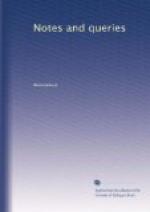Alfred Gatty.
Ecclesfield, June 28. 1850.
I can only give from recollection a statement of a tradition, that when Jesus Christ died he turned his head towards the south; and so, ever since, the south side of a church has the pre-eminence. There generally is the bishop’s throne, and the south aisle of ancient basilicas was appropriated to men. Simple observation shows that the supposed sanctity extends to the churchyard,—for there the tombstones lie thickest.
I find that my source of information for the {127} tradition was Cockerell’s last lecture on Architecture, Athenaeum for 1843, p. 187. col. 3.
A.J.H.
“Men are but Children,” &c.—R.G. (Vol. ii., p. 22.) will find the line about which he inquires in Dryden’s All for Love; or, The World well Lost, Act iv. Sc. 1.
Dolabella (loq.):
“Men are but children of a larger
growth,
Our appetites as apt to change as theirs,
And full as craving too, and full as vain.”
J.R.M.
King’s College, London, July 12. 1850.
Ventriloquism (Vol. ii., p. 88.).—Mr. SANSOM will find some curious information touching the words [Hebrew: ’or], [Greek: eggastrimuthos], &c., in Dr. Maitland’s recent Illustrations and Enquiries relating to Mesmerism, pp. 55. 81. The Lexicons of Drs. Lee and Gesenius may also be consulted, under the word [Hebrew: ’or]. The former of these lexicographers would rank the Pythian priestess with “our modern conjurers.”
C.H.
St. Catharine’s Hall, Cambridge.
Cromwell’s Estates—Magor (Vol. i., p. 277. 389.).—As the South Wales line is now open as far as Chepstow, it may not be uninteresting to V. to know, that it diverges from the coast between Chepstow and Newport, in order to pass Bishopston and Magor, the last of which he rightly placed in Monmouthshire.
SELEUCUS.
Vincent Gookin (Vol. i., pp. 385. 473. 492.; Vol. ii. p. 44.) is described in a Narrative of the late Parliament (Cromwell’s Parliament, d. 1656), in the Harleian Miscellany, as
“One of the letters
of land in Ireland, receiving three hundred
pounds per annum.”
He and three other Irish members, Colonel Jephson, Ralph King, and Bice, are classed together in this tract, which is hostile to Cromwell, as
“Persons not thought meet to be in command, though they much desire it, and are of such poor principles and so unfit to make rulers of as they would not have been set with the dogs of the flock, if the army and others who once pretended to be honest had kept close to their former good and honest principles.”
Vincent Gookin voted for the clause in the “Petition and Advice” giving the title of “King” to Cromwell.
CH.
All-to brake (Vol. i., p. 395.).—The interpretation given is incorrect. “All-to” is very commonly used by early writers for “altogether:” e.g., “all-to behacked,” Calfhill’s Answer to Martiall’s Treatise of the Cross, Parker Society’s edition, p. 3.; “all-to becrossed,” ibid. p. 91.; “all-to bebatted,” ibid. p. 133., &c. &c. The Parker Society reprints will supply innumerable examples of the use of the expression.




